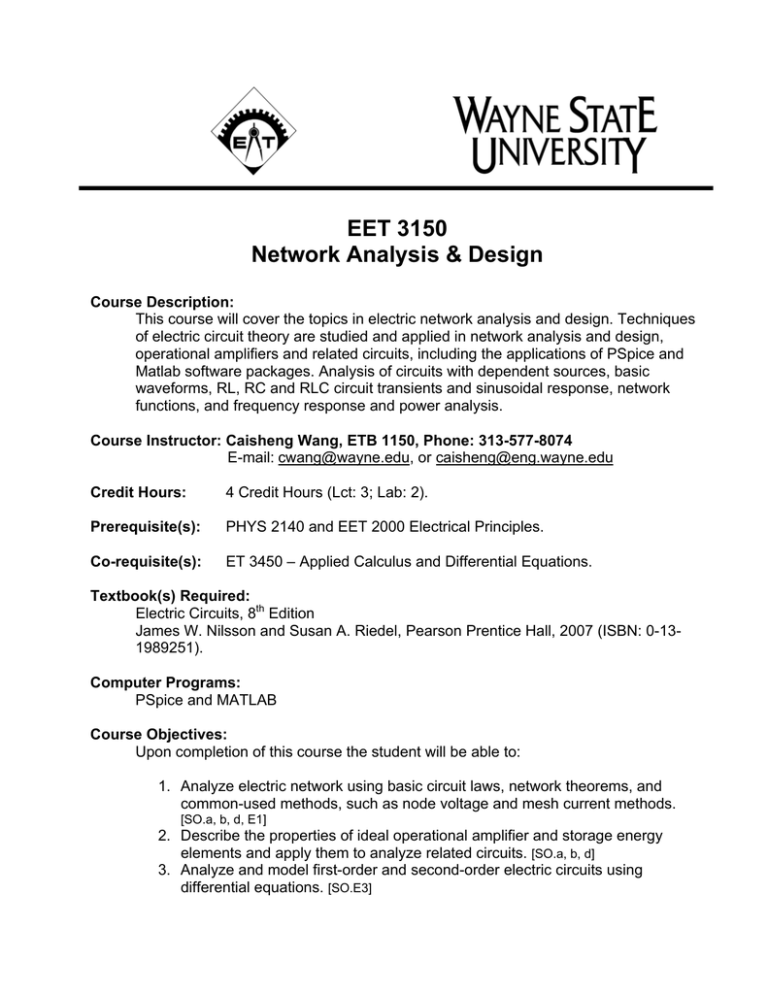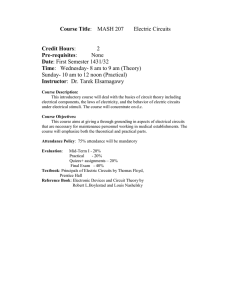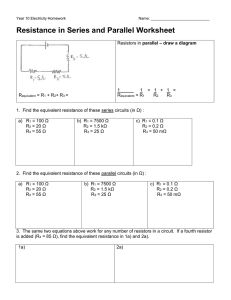
EET 3150
Network Analysis & Design
Course Description:
This course will cover the topics in electric network analysis and design. Techniques
of electric circuit theory are studied and applied in network analysis and design,
operational amplifiers and related circuits, including the applications of PSpice and
Matlab software packages. Analysis of circuits with dependent sources, basic
waveforms, RL, RC and RLC circuit transients and sinusoidal response, network
functions, and frequency response and power analysis.
Course Instructor: Caisheng Wang, ETB 1150, Phone: 313-577-8074
E-mail: cwang@wayne.edu, or caisheng@eng.wayne.edu
Credit Hours:
4 Credit Hours (Lct: 3; Lab: 2).
Prerequisite(s):
PHYS 2140 and EET 2000 Electrical Principles.
Co-requisite(s):
ET 3450 – Applied Calculus and Differential Equations.
Textbook(s) Required:
Electric Circuits, 8th Edition
James W. Nilsson and Susan A. Riedel, Pearson Prentice Hall, 2007 (ISBN: 0-131989251).
Computer Programs:
PSpice and MATLAB
Course Objectives:
Upon completion of this course the student will be able to:
1. Analyze electric network using basic circuit laws, network theorems, and
common-used methods, such as node voltage and mesh current methods.
[SO.a, b, d, E1]
2. Describe the properties of ideal operational amplifier and storage energy
elements and apply them to analyze related circuits. [SO.a, b, d]
3. Analyze and model first-order and second-order electric circuits using
differential equations. [SO.E3]
4. Use computer software (PSpice and Matlab) for circuit simulation and
analysis. [SO.a]
5. Apply Laplace Transform to solve circuit programs and to obtain transfer
function of a circuit network. [SO.E3]
6. Apply phasors in steady-state AC circuit analysis. [SO.E1, E3]
7. Exhibit responsibility and work effectively as a team in a laboratory
environment and homework discussion. [SO. e]
8. Apply proper techniques in recording and displaying laboratory data. [SO.c]
9. Communicate clearly, concisely and correctly in written, oral and visual forms
(as proven in tests and labs) that effectively convey ideas and concepts to
peers and faculty, using proper technical terminology. [SO.g]
Topics and Schedule:
Ind.
Date
Topic
1
2
3
4
5
1/13 – 1/15
1/20
1/22
1/27 – 1/29
2/3
6
2/5
7
2/10
8
9
2/12
2/17
10
2/19
11
12
13
2/24
2/26-3/3
3/5
14
3/10
15
16
3/12
3/24
17
3/26-3/31
18
19
20
21
22
4/2
4/7–4/9
4/14 -4/16
4/21 – 4/23
Review: Basic Circuit Concepts, Circuit Laws
Circuit Analysis Methods and Theorems (I)
Lab 1: Introduction to PSpice and Matlab
Circuit Analysis Methods and Theorems (II)
Lab 2: Voltage and Current Dividers
Lab 3 Node Voltage and Mesh Current
Analysis and Thévenin Equivalent Circuits
Lab 4 Superposition and Maximum Power
Transfer
Exam 1
Operational Amplifiers
Energy Storage Components: Capacitors
and Inductors
Lab 5: Operation Amplifer Circuits
First-Order Circuit Analysis
Second-Order Circuit Analysis
Lab 6 Responses of the First-Order RL and
RC Circuits and the Integrating Amplifier
circuits
Exam 2
AC Circuits and Phasor Represntation
Sinusoidal Steady-State Analysis and AC
Power Caculation
Lab 7 AC Loads At Different Power Factors
Laplace Transform
Circuit Analysis Using Laplace Transform
Transfer Function and Frequency Response
Final Exam
No. of
Lectures
2
1
1
2
1
1
1
1
1
1
1
2
1
1
1
1
2
1
2
2
2
1
Office Hour
2:00 pm – 3:30 pm, Tuesday and Thursday
Contributions to EET Student Outcomes:
BSEET Student Outcomes
1
a.
2
b.
3
c.
3
d.
2
e.
f.
g.
h.
i.
j.
2
3
k.
E1
E2
3
E3
An appropriate mastery of the knowledge, techniques, skills and modern tools of
their disciplines
An ability to apply current knowledge and adapt to emerging applications of
mathematics, science, engineering and technology
An ability to conduct, analyze and interpret experiments and apply experimental
results to improve processes
An ability to apply creativity in the design of systems, components or processes
appropriate to program objectives
An ability to function effectively on teams
An ability to identify, analyze and solve technical problems
An ability to communicate effectively
A recognition of the need for, and an ability to engage in lifelong learning
An ability to understand professional, ethical and social responsibilities
A respect for diversity and a knowledge of contemporary professional, societal and
global issues
A commitment to quality, timeliness, and continuous improvement
The ability to analyze, design, and implement control systems, instrumentation
systems, communication systems, computer systems, or power systems
The ability to apply project management techniques to electrical/electronic(s)
systems
The ability to utilize statistics/probability, transform methods, discrete mathematics,
or applied differential equations in support of electrical/electronic(s) systems
Grading Policy:
Test 1
Test 2
Final
Homework
Labs
Grading Scale:
A
93-100
A90-92
B+
87-89
B
83-86
B80-82
C+
77-79
C
73-76
C70-72
D+
67-69
D
63-66
D60-62
F
Below 60
15%
15%
20%
20%
30%
WITHDRAWAL POLICY:
Last day to drop with a tuition refund: End of 2nd Week of Semester
Last day to drop without a notation of W on the transcript: End of 4th Week
Final day to drop with W (ET Students): End of 8th Week
Depending on the situation of withdrawal, one of the following grades will be assigned:
WP: Withdrawal with Passing
WF: Withdrawal with Failing
WN: Withdrawal Never Attended
All drop/add activity during the first four weeks should be done by the student through
Pipeline. Withdrawal after the fourth week requires the instructor’s permission and must
be submitted on a Drop/Add form to the Registrar’s Office. Withdrawal after the ‘final
drop’ date will only be permitted under exceptional circumstances and requires the
permission of the Chair of the ET Division. A failing grade is not an acceptable reason for
withdrawal after the ‘final drop’ date.
POLICY ON CHEATING:
Cheating is defined by the University as “intentionally using or attempting to use, or
intentionally providing or attempting to provide, unauthorized materials, information, or
assistance in any academic exercise.” This includes any group efforts on assignments
or exams unless specifically approved by the professor for that assignment/exam.
Evidence of fabrication or plagiarism, as defined by the University in its brochure
Academic Integrity, will also result in downgrading for the course. Students who cheat on
any assignment or during any examination will be assigned a failing grade for the course
and may be subject to additional penalties.
University / Department Policies:
Academic Integrity
http://www.doso.wayne.edu/judicial/academic-integrity.htm
Code of Ethics for Engineers:
WSU library has a tutorial that talks about transmitting ideas, plagiarism, copyright, and
citing sources. At the end, there is a quiz. You are encouraged to visit this site then take
the quiz at the end.
http://www.lib.wayne.edu/services/instruction_tutorials/searchpath/mod6/contents.html
The following list gives additional sites:
http://onlineethics.org/codes/
http://www.iit.edu/departments/csep/codes/coe/abet-a.html
Last Updated:
January, 2010
Prepared by: Dr. Caisheng Wang



